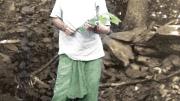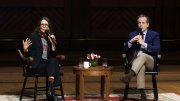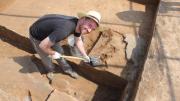Splendiferous in his purple Russian blouse, with shaggy hair and beard, Hervey White, A.B. 1894, helped transform a tiny village in the Catskills into a famous colony of the arts. A freethinker, socialist, writer, and printer, with a “genius for friendship,” he created his own utopia in Woodstock, New York, and called it “The Maverick.” His charisma, Midwestern practicality, and visionary thinking enabled him to befriend artists and wealthy socialitesa talent he wisely used to realize his dreams.
Born in a small Iowa town, White was raised by his aunt after his mother died. When he was 10, she told him about Harvard, where Longfellow had taught and Emerson had studied. “I was resolved to be a writer and go to Harvard,” he later wrote. That year he also decided to “do what I like and go where I like without money, paying for my living as I go. Good advice has never driven it out of me.”
After working his way through two years at the University of Kansas, White won a scholarship to Harvard his junior year. Philosophy and aesthetics courses taught by Josiah Royce and George Santayana revolutionized his thinking. Reading Tolstoy, Thoreau, Whitman, and Carlyle further expanded his mind; reading John Ruskin convinced him never to take money for his writinghe would earn his living by work, not art.
By 1896 he was in Chicago, managing musical and theatrical events for social reformer Jane Addams at Hull House, the innovative settlement house where contemporaries such as John Dewey, Clarence Darrow, Charlotte Perkins Gilman, and Eugene Debs also gathered. White’s experiences there inspired his first novel, Differences (1899), in which a settlement worker falls in love with a widower she has met in her charity rounds. A second novel, Quicksand (1900), depicting the struggles of farmers and of women, won good reviews; Theodore Dreiser judged it “one of the six great novels of the world.” When White received his first royalty check, for $200, he gave the money to a friend for study in Europe.
While at Hull House, White also met Ralph Radcliffe Whitehead, a wealthy Englishman who shared his interest in establishing an art colony. Whitehead chose a large tract of land high on Overlook Mountain, above the Hudson River valley town of Woodstock, New Yorkin the country, yet close enough to New York City to facilitate sales of the fine furniture and other crafts produced by the artists he planned to invite there. As White helped construct “Byrdcliffe,” with its extravagant plumbing and many buildings, in 1902, he realized that his fantasy of buying the colony would never happen: he couldn’t afford it. Furthermore, his relationship with Whitehead had begun to sour. “He would only employ people he could dictate to,” White wrote later, “and no self-respecting artist would ever stand for his dictation.”
And White had ideas for his own colony, to “[offer] young talent a chance to earn its living until its recognition” and to be named for a wild horse: “belonging to no one, but to whoever can get it.” In 1904, he bought a 102-acre farm on the edge of Woodstock, where he settled with his wife until two sons stretched his meager income and strained the marriage. Although he worked briefly in Manhattan, in 1908 he returned to the farm alone. He continued to write and later bought a hand press and printed books, plays, poetry, and literary magazines. He built rustic cabins for the Maverick’s first residents and charged rent only if they had the money.
Woodstock by then was home to the New York City-based Art Students League summer school. If some town residents eyed the influx of artists eager for plein air instruction with suspicion, most appreciated the ensuing economic benefits. White himself was keenly aware that he needed local support to keep the Maverick going; he noted in the first issue of one of his magazines, The Plowshare, “We are not revolutionaries; we are but harmlessly tinged with radicalism; we are not the wild anarchists that onlookers might judge us from the freedom exhibited in our clothes.”
In 1915, White had built seven or eight cabins and needed an additional well drilled; it cost $1,500. As the debt “grew insistent,” he decided to create a carnival-like fundraising festival on the night of the full moon that August. An orchestra played, costumed revelers picnicked and played games around campfires, and “Queen Catherine” performed a court dance in the moonlight to end the show.
Although White only broke even that first year, the festivals continued every August, becoming more extravagant and drawing bigger crowds, until rowdiness forced him to end them in 1931. The proceeds paid the colony’s expenses and also allowed White to build an outdoor concert hall that still hosts Sunday afternoon chamber music in the summer, a large theater (since demolished), and more than 30 cabins inhabited by artists, writers, actors, poets, and musicians for more than three decades.
At the end of his life, White wrote, “It was the irony of fate that the books I had for years been making sacrifice should never be read by those admirers [of the festivals.] Whereas, a plaything, a painted toy I had created to pay my living should be thought of as the outcome and aim of my whole life.” But his greatest achievement, made possible by his love of humanity, was to create the magic of the Maverick, casting a spell that still attracts artists and musicians to Woodstock today.
Nina Flanagan is a freelance writer currently living in Woodstock, New York.






